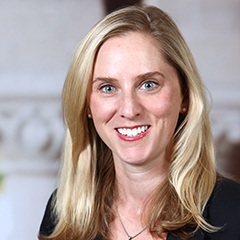Elizabeth Leisy Stosich

Ed.D.
Associate Professor
113 W. 60th Street
Room 1119E
New York, New York 10023
Phone: 212-636-6439
Fax: 212-636-7875
Email: [email protected]
Office hours: Wednesdays 3:30-5:30 p.m.
Elizabeth Leisy Stosich is an associate professor and Associate Chair of the Division of Educational Leadership, Administration, and Policy. She joined the Fordham faculty in 2017. Stosich's research focuses on understanding how district, school, and teacher leaders can work together to strengthen the quality and equity of students' learning opportunities and outcomes.
In 2022, Stosich was awarded the Emerging Scholar Award by Division A of the American Educational Research Association (AERA) in recognition for her contributions to the field of educational leadership and organizational theory. In 2016, she was awarded the Dissertation of the Year Award by the AERA Leadership for School Improvement Special Interest Group for her dissertation research on the leadership practices, professional learning opportunities, and teacher team practices that support educators in responding effectively to new and more ambitious academic standards.
Stosich's work has appeared in such journals as the American Educational Research Journal, Educational Evaluation and Policy Analysis, and Journal of Educational Administration. Her co-authored book, The Internal Coherence Framework: Creating the Conditions for Continuous Improvement in Schools, was published by Harvard Education Press and is widely used in districts, schools, and educational leadership programs.
Prior to joining the Fordham faculty, Stosich was a research and policy fellow at the Stanford Center for Opportunity Policy in Education. She received her Ed.D. in Education Policy, Leadership, and Instructional Practice and Ed.M. in Education Policy and Management at Harvard University. Previously, she taught elementary school in Oakland, CA.
-
Ed.D., Education Policy, Leadership, and Instructional Practice
Harvard Graduate School of EducationEd.M., Education Policy and Management
Harvard Graduate School of EducationM.A., Teaching and Multiple Subjects CLAD Credential
University of San FranciscoB.A., Spanish and Portuguese
University of California, Berkeley -
Community of Inquiry I
Implementation Research and Program Evaluation
Leading Instructional Improvement
Politics of Educational Leadership and Reform
Urban Education
-
Education policy
School and district leadership
Teachers’ professional learning
Research-practice partnerships
-
Book
Forman, M.L., Stosich, E.L., & Bocala, C. (2017). The Internal Coherence Framework: Creating the conditions for continuous improvement in schools. Harvard Education Press.
Peer Reviewed Journal Articles
Meyers, C., Thessin, R.A., & Stosich, E.L. (2022). An Exploration of How District Leaders Organize to Support Underperforming Schools in Mid-sized Districts, Educational Management, Administration & Leadership. https://doi.org/10.1177/17411432221111667
Hodge, E.M., & Stosich, E.L. (2022). Accountability, Alignment, and Coherence: How Educators Made Sense of Complex Policy Environments in the Common Core Era. Educational Evaluation and Policy Analysis, 44(4), 543-566. https://doi.org/10.3102/01623737221079650
Stosich, E.L. (2021). “Are we an advisory board or a decision making entity?”: Teachers’ involvement in decision making in instructional leadership teams. Leadership and Policy in Schools, 1-19. https://doi.org/10.1080/15700763.2021.1995879
Stosich, E.L., Hatch, T., Hill, K., Roegman, R., T Allen, D. (2021). Social networks and policy coherence: Administrators’ Common Core and teacher evaluation advice networks. Education Policy Analysis Archives, 29(60). https://doi.org/10.14507/epaa.29.5990
Stosich, E.L. (2020). Central office leadership for instructional improvement: Developing collaborative leadership among principals and instructional leadership team members. Teachers College Record, 122(9). https://www.tcrecord.org/Content.asp?ContentId=23383
Stosich, E.L., Bae, S., & Snyder, J. (2018). Redesigning assessment and accountability: An introduction. Education Policy Analysis Archives, 26(7). http://dx.doi.org/10.14507/epaa.26.2906 This article is a part of the special issue, Redesigning Assessment and Accountability for Meaningful Student Learning, guest-edited by Soung Bae, Jon Snyder, and Elizabeth Leisy Stosich.
Stosich, E.L., Snyder, J. & Wilczak, K. (2018). How do states integrate performance assessment in their systems of assessment? Education Policy Analysis Archives, 26(13). http://dx.doi.org/10.14507/epaa.26.2906 This article is a part of the special issue, Redesigning Assessment and Accountability for Meaningful Student Learning, guest-edited by Soung Bae, Jon Snyder, and Elizabeth Leisy Stosich.
Stosich, E.L. (2018). Principals and teachers ‘craft coherence’ among accountability policies. Journal of Educational Administration, 56(2), 203-219. https://doi.org/10.1108/JEA-10-2016-0124.
Stosich, E.L., Bocala, C., & Forman, M. (2018). Building leadership and organizational capacity through professional development: A design-based implementation research study. Educational Management, Administration & Leadership, 46(5), 864-880. https://doi.org/10.1177%2F1741143217711193
Stosich, E.L. (2017). Leading in a time of ambitious reform: Principals in high-poverty urban elementary schools frame the challenge of the Common Core State Standards. Elementary School Journal, 117(4), 539-565. https://doi.org/10.1086/691585
Stosich, E.L. (2016). Joint inquiry: Teachers’ collective learning about the Common Core in high-poverty urban schools. American Educational Research Journal, 53(6), 1698-1731. https://doi.org/10.3102/0002831216675403
Stosich, E.L. (2016). Building teacher and school capacity to teach to ambitious standards in high-poverty schools. Teaching and Teacher Education, 58, 43-53. https://doi.org/10.1016/j.tate.2016.04.010
Practitioner Journals:
Stosich, E.L., Forman, M. L., & Bocala, C. (2019). All together now: The Internal Coherence Framework supports instructional leadership teams. The Learning Professional, 40(3), 40-44. Retrieved from https://learningforward.org/wp-content/uploads/2019/06/the-learning-professional-june2019.pdf
Stosich, E.L. & Bocala, C. (2018). Leading teacher teams: Bridging the divide between data inquiry and instructional change. Journal of Cases in Educational Leadership, 21(3), 88-102. https://doi.org/10.1177/1555458917744842.
Stosich, E.L. & Bae, S. (2018). Engaging diverse stakeholders to strengthen policy. Phi Delta Kappan, 99(8), 8-12. https://doi.org/10.1177%2F0031721718775670